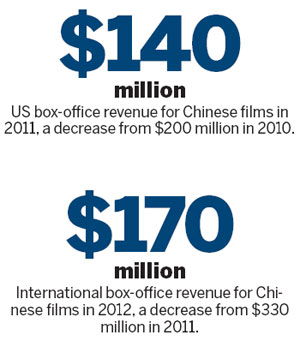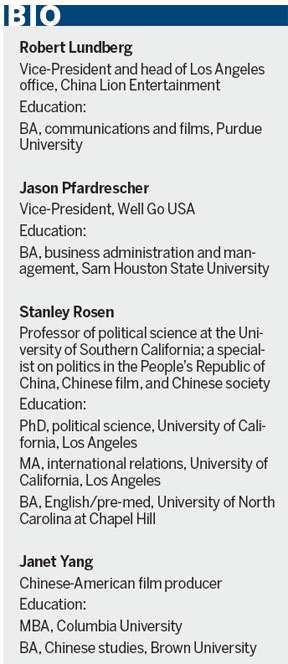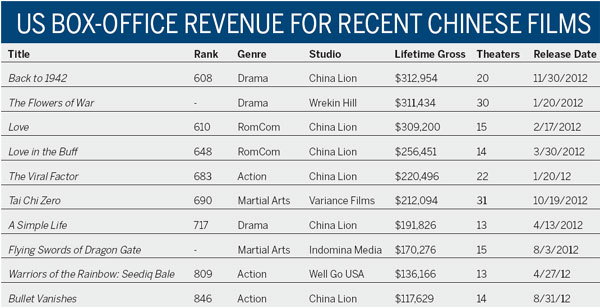Chinese Films in the US: Not a full house
Updated: 2013-08-30 11:05
By Wang Jun and Liu Yiyi (China Daily)
|
||||||||
|
A poster in the lobby of AMC Atlantic Times Square Theater in Los Angeles advertises the Chinese-language movie The Grandmaster. Liu Yiyi / China Daily |
More movies from China are released, but they aren't attracting Westerners, causing box-office receipts to tumble, report Wang Jun and Liu Yiyi from Los Angeles.
Walk through the lobby of AMC Atlantic Times Square Theater in Los Angeles on a Friday night and you may wonder whether you are in China.
Huge posters of Chinese movies are on the walls and at least one of its 14 theaters is full of young Chinese adults watching Chinese movies recently released on the big screen in China, such as The Rooftop, Tiny Times, Drug War and The Grandmaster.
"This situation is hard to be imagined even three years ago," said Robert Lundberg, vice-president of China Lion Entertainment, a leading Chinese film distributor in the US. "There were only two or three Chinese movies released a year in certain locations three years ago. But now, there is always at least one Chinese-language film in theaters."
Ironically, that audience is one of the major challenges facing movies made in China: There aren't Westerners there and it's causing box-office receipts to suffer.
According to the statistics from EntGroup, revenue from Chinese films in the US fell to 860 Million yuan (about $140 million) in 2011 from about $200 million in 2010. International revenue for Chinese films declined to about $170 million in 2012 from about $330 million in 2011, according to Silver Paper: Report on International Spread of Chinese Movies 2012.

"The audience was very different dating back to the '90s from today's Chinese movies," said Stanley Rosen, professor of political science at the University of Southern California. "Most of the audience for the films such as Crouching Tiger, Hidden Dragon were Americans, but for the movies today, very few Westerners go to see them. The main audiences of today's Chinese films are Chinese in the US, mainly Chinese students. The market for Chinese films became very limited outside the Chinese community. The Chinese films today are played only in a very limited number of theaters and last for a very short time."
According to Box Office Mojo, in the US Crouching Tiger, Hidden Dragon was played in 2,027 theaters and Miramax's popular Chinese film Hero was played in 2,175 theaters. While two recent Chinese films Lost in Thailand and So Young were played in only 35 and three theaters respectively.
Past success
Chinese films were very successful in the US market in the past, with many high on the box-office tally for foreign-language films. Crouching Tiger, Hidden Dragon was at the top. Its box-office take was $128 million, twice as much as the box office for the Italian film Life is Beautiful, which ranked second. Hero ranked third, with a box office of nearly $54 million.
But the golden time for made-in-China movies has passed. The most successful film last year was Back to 1942. With a box office of around $313,000, it ranked 608 on the box-office receipt total for foreign-language films in the US.
"Zhang Yimou's movies back to the 1990s had $2 million box office in the US. The most recent Zhang Yimou films didn't do anything near that well," said Rosen.
"The genre of Chinese film being distributed in the US has also changed. The most successful Chinese films in the US market before 2006 were action movies or martial arts movies, and dramas directed by famous directors such as Ang Lee, Zhang Yimou, Chen Kaige and Wong Kar-wai. On the 2012 list of the most successfully distributed Chinese films in the US, the number of action movies or martial arts movies declined and romantic comedies increased."
In terms of distributors, Chinese films in the 1990s or the beginning of the 21st century were distributed by major US companies. Sony, the number six distributor in the US, put out Crouching Tiger, Hidden Dragon; and the Miramax-distributed Hero.
Today, a leading distributor for Chinese films in the US is China Lion Entertainment, a company ranked 41st for total gross and market share in the US in 2012. That year it distributed five of the top 10 Chinese films in the US.
Lundberg said distributors now have a more focused business model. He said China Lion's target audience is in big cities between the ages of 18 and 34, born in the Chinese mainland, Hong Kong or Taiwan, and who can speak Mandarin.

He said China Lion picks movies according to the taste of its target audiences. Therefore, they tend to distribute more romantic comedies and dramas that are popular in the Chinese market, and they only distribute the films in theaters in big cities' where there is a Chinatown.
Well Go Entertainment, another key player in Chinese film distribution in the US, said Chinese-language films accounted for 65 percent of all films it distributed.
"Foreign comedies don't translate very well," said Jason Pfardrescher, vice-president of Well Go. They will translate to Chinese audiences but only to Chinese audiences, he said. "I know there were really great Chinese comedies, but we decided to take them out because for business reasons it does not make sense to release in North America."
Rosen said there is a cultural difference, with Chinese comedies always telling Chinese stories that are made for Chinese audiences. "Unless you are from China, you'll not find it particularly interesting," he said. "It's very hard to get Westerners interested in the stories or even understand the stories."
Rosen said Lost in Thailand did well in China and received very good ratings in Italy, Japan and South Korea. The film made more than $200 million in the Chinese market, but only $60,000 in the US. Let the Bullets Fly was another successful film in the Chinese market, but Americans walked out at the film's screening because they could not understand it.
Like Chinese foreign-language comedies, Chinese foreign-language dramas also have not done well in the US market. Lundberg cited A Simple Life, a Chinese drama released by China Lion last year. "It was among the top 10 films of the year rated by a well-known American movie critic, Roger Ebert. But the American audience did not even know the film existed," he said. The film's box office was $191, 826 and ranked seventh among all Chinese films distributed in the US in 2012.
"Action movies tend to be more successful than other genres," Pfardrescher said. "There's no secret that Well Go focuses on action movies and martial arts movies."
Since 1980, the Chinese movies that had a box office over $10 million were all action movies. "When watching Crouching Tiger, Hidden Dragon, many people did not even realize that was in subtitle because they were watching the action," Rosen explained.
"The time of Crouching Tiger, Hidden Dragon is gone. Now martial arts films are hard to be that successful. Foreign-language films have not done very well in the US since 2006. It's not only for Chinese films, but for all foreign language films," he said.
The change
Rosen said the change started with the US Academy Award nominations in 2006. Almost all of the nominees for Best Picture were independent films. Because the independent films were so successful, every major studio including Warner Brothers, Universal Studios, Paramount Pictures, Walt Disney Pictures started to set up their own small companies within their main studios and began to produce independent films.
Soon after that, there was greater competition in the independent-film industry, which made making those films more expensive. As a result, instead of booking foreign-language films, multiplex theaters began to book independent films from major studios. It became more difficult for foreign-language films to be on any screens in major theaters.
There was also competition from France, Italy, Japan, Sweden and elsewhere, which basically eliminated Chinese-language films. "The competition is so fierce," Rosen said, "even American independent films have not done that well since 2006."
Janet Yang, an American film producer, said the overall movie industry in the US is declining. "There are so many other distractions in our daily life. We have to admit that movies are no longer the dominating entertainment," she said.
Yang said the box office is facing challenges. "If you read reports that the box office is going up, that is only because the ticket price is going up," she said. "There is no growth in the number of tickets being sold."
Co-production films
Rosen agreed. "Ninety percent of the Chinese overseas box office receipts are from co-production films", he said. "The co-production has been declining greatly these years because China is getting stricter about what co-production is. It is hard for films to be accepted for co-production today."
Regulations for doing a co-production film in China cover a film's content, the number of Chinese stars and the percentage of funding provided by a Chinese company. The requirements may result in unsatisfactory global box-office receipts outside China. The makers of Iron Man 3, which was released this summer, decided not to do a co-production in Chinese.
Distributors are still hopeful.
"China Lion is gaining audiences these years, and China Lion is very confident with what they are doing," Lundberg said. The company's box-office gross in 2010 was $365,000 and increased to $818,000 in 2011 and $1.7 million in 2012.
Christopher Chen, vice-president of business development with Endgame Entertainment, an American company that co-produced Looper, said that per-screen-average box office should be the key criterion of the success of independent films. The overall box office may be low because the film is only played in a limited number of theaters, but the film is still a good film if the per-screen-average box office is high, he said.
Pfardrescher said Well Go is continuously growing and is doing very well. He attributed Well Go's success to strong relationships with digital platforms, such as Netflix, Hulu, iTunes, Amazon and Sony Play Station. "The max majority of Well Go's revenue comes from home entertainment, which is everything outside the theater," he said.
Transition period
Yang said that the film industry is in a transition period, and agreed that the digital platform is the future. She said theaters are only for the big budget, profitable franchises and everything else should go digital.
Pfardrescher said releasing films in movie theaters is very expensive. Well Go came up with a new model to release Ip Man: Final Fight. The film was first available through video-on-demand (VOD) digital platforms and then released in selected theaters a month later in September. Pfardrescher said this new model - releasing films on digital platforms before the traditional movie-theater release - makes it possible to reach general marketing exposure with less expense.
Lundberg said Well Go partnered with China Lion and helped to distribute several films such as A Simple Life on digital platforms. China Lion has its own channel on Hulu and has part of its content available on Netflix and other pay-per-view digital platforms.
Pfardrescher said China is now having its "golden time" for film production. He expects more good Chinese films in the future. Lundberg said the outside world is entering into China these days, and he believed that it will help China to produce more interesting stories.
Yang, a US-born Chinese, said she fell in love with China and began to learn Chinese when she visited China for the first time as a teenager. Later, she got her bachelor's degree in Chinese studies from Brown University.
From her personal experience, she said it takes time for Westerners to understand Chinese culture. Understanding between the two countries and the two cultures is growing, but it is a long journey, she said.
Yang said she has been waiting for the success of Chinese films since the 1980s. "Today is the golden time for the Chinese film market. This day finally arrives."
But in terms of marketing, when measuring the success of Chinese films, one should keep "realistic expectations", Rosen said.
Contact the writers at wangjun@chinadailyusa.com and yiyiliu@chinadailyusa.com

(China Daily USA 08/30/2013 page20)
- Chang calls for closer ties with ASEAN members
- 'Don't flaunt ASEAN banner' on the S. China Sea issue
- Obama makes case for Syria strike, British house votes no
- Russian Navy to rotate warships in Mediterranean
- UN should continue chemical weapons probe: Russia
- Envoy in DPRK to seek release of US citizen

 Jeremy Lin's campaign of animal protection
Jeremy Lin's campaign of animal protection
 Solar panel maker hits milestone
Solar panel maker hits milestone
 Vineyards pour billions into chateaus
Vineyards pour billions into chateaus
 Fair brings Hami melons to Beijing
Fair brings Hami melons to Beijing
 Court sentences 56 for telecom scam
Court sentences 56 for telecom scam
 Foreigners given opportunities to shine
Foreigners given opportunities to shine
 US vows action in Syria even without UN backing
US vows action in Syria even without UN backing
 Li Na advances to 3rd round
Li Na advances to 3rd round
Most Viewed
Editor's Picks

|

|

|

|

|

|
Today's Top News
Google executive to aid Xiaomi's growth
UK parliament rejects Syria strike
Visa issues resolved in new policy
Solar panel maker hits milestone
Xi calls for innovation push
Tougher environment takes toll on bank results
Vineyards pour billions into chateaus
Oil giants fail environmental tests
US Weekly

|

|







